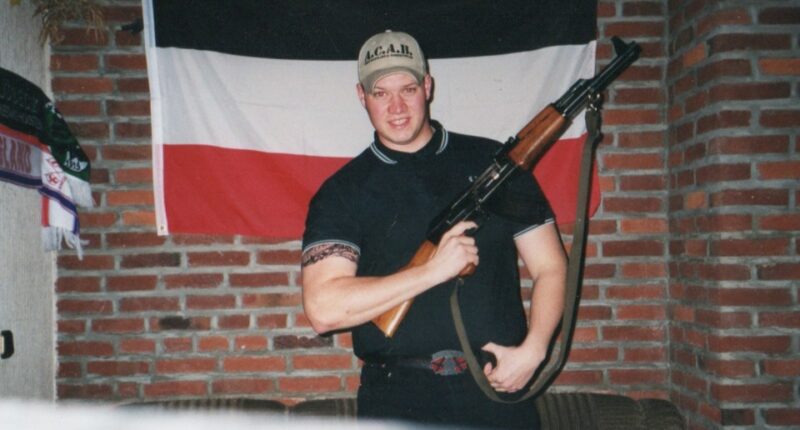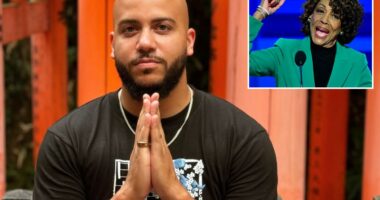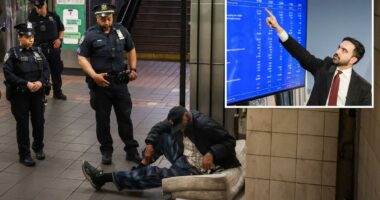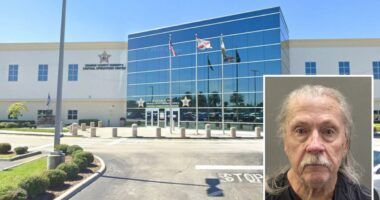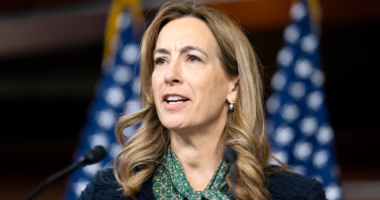Share this @internewscast.com
CHILLING tattoos snake across Philip Schlaffer’s chest as a permanent reminder of his violent past as a devotee of a Hitler-doting hate gang.
At the mere age of 15, Philip became involved with the German Neo-Nazi movement, remaining in this extremist circle for over 15 years, during which he was indoctrinated and too scared to depart, until a shocking incident jolted him back to reality.
His youth was spent attending sickening rallies, wielding bats, and beating up and terrorising locals with his swastika-adorned comrades.
Hated by locals, he dealt drugs to earn his keep as he spent his teens and twenties huddled around pub tables discussing plans for a Fourth Reich.
He eventually managed to extricate himself from the toxic environment years later, driven by a horrifying experience where he saw fellow members brutally beat and kill a stranger at a nightclub.
Now, almost two decades after leaving the clan, Philip has revealed his misery and regret over the years he lost with such “losers”.
Speaking to The Sun, Philip said he was lured into the sick group despite his “normal” upbringing with “everything he wanted”.
Philip’s journey began when his father’s job moved the family to the UK when he was 10, only to return to Germany after four years. This disruption left him feeling isolated and alienated, leading him towards a violent lifestyle.
He said: “I was angry against my parents, angry against society, against school. And I was looking for a new family, for new friendships.
“I needed something to shout out my anger and I used German right-wing music for this because I was very angry.
“And in this music they told me, Philip, come to us, we are your new family. And for a short time they gave me friendships.”
Listening to venom-spewing music every day slowly eroded his sense of self and increased his anger at the world.
He said: “The hate went into my brain. It’s hate against all sorts of people, against Muslims, against Jews, against foreigners, against everybody.”
Soon, Philip found himself ensnared by a despicable group devoted to Hitler’s ideologies, mistakenly believing they were devoted patriots aiming to improve Germany.
The organization, known as the One Percenter, an illegal motorcycle gang, drew Philip in through casual meetups in pubs where they shared their bleak worldviews.
He recalled: “The main thing I heard was like, you are strong, come to us, be proud of Germany, be proud of your ancestors.
“But these meetings within the political party, we met in a sort of pub. And there were these older guys talking about the Fourth Reich.
You’re alone, you have no friends, you have a destroyed relationship with your family.
Philip Schlaffer
“And when I talk about it today, I feel really sad, having wasted my young life listening to all these social losers.
“None of them had charisma. They were not integrated into good work. They were social losers.
“But I looked up to them because they were talking about all this bright future, the Fourth Reich.”
Philip gradually ascended the club’s ranks, absorbing its sinister doctrines from older members, and eventually headed his own faction in the eastern city of Wismar.
He described how his clan “terrorized” the streets – leveraging their big builds, bald heads, and tattooed skin to instil fear in communities.
He recalled: “People constantly feared meeting us or seeing us.”
ROAD TO REDEMPTION
But one night everything changed when he watched members of his group brutally stab and murder a lad in a nightclub.
He said: “It was after this murder that I asked myself what is this all for? Someone just died. I had lost all empathy for people in this life full of hatred.
“I realised I just had to leave. I also recognised my life was s**t and I’m a s**thole as well.”
By the time Philip had decided he needed to escape the hate-spewing gang, he was under immense pressure from the police for his years spent in crime.
During a stint in prison, he sought guidance from a psychologist on how to cut ties with the murderous movement, repent his sins, and build a new life integrated in society.
The road to recovery was tough.
Overnight, he became the movement’s enemy and was cast as a traitor.
He said: “The first days and weeks I felt like I was the loser and I thought about how I wasted my life and and how I had all these enemies.
People constantly feared meeting us or seeing us.
Philip Schlaffer
“You’re alone, you have no friends, you have a destroyed relationship with your family.”
But after weeks grappling with his new-found isolation, his life quickly took a positive turn.
There was “no more police pressure, no more violence, no more hate” – a feeling completely alien to a man once embroiled in a life of crime.
The journey to redemption was “like a marathon” but Philip embraced the challenge and took steps making it up to the people he had hurt.
He is now lynch pin in the fight against extremist groups and works closely with communities to prevent young people from becoming radicalised.
Sharing his experiences online, he’s amassed thousands of followers with many hailing him a “role model”.
One said: “For me, this guy is a prime example for the fact that people can truly change.”
While another wrote: “This man has had a full redemption arc. He was gull of hate, then he dropped it and is now helping people overcome their own hate. That’s really commendable.”
FIGHTING EXTREMISM
According to research by Global Project Against Hate and Extremism (GPAHE), young men are being recruited into these Hitler Youth-styled clubs at a rate never seen before.
Philip owes this hike to growing taboo around certain issues, such as immigration, and censoring children’s views.
In Germany, he suggests many young people are turning to extremist groups because their voices are silenced in mainstream politics.
Taking immigration as an example, he said teens are often called Nazis if their views don’t align with liberal thought, which can have devastating effects.
He said: “The problem is, now these people say okay if you call us a Nazi, I will be a Nazi.
“If this is a Nazi, if this is the far right, just because I want to talk about it, even if you are democratic views on it.”
He added: “So I think that the people have the feeling they have not been heard by politics. They are disappointed by politics.”
